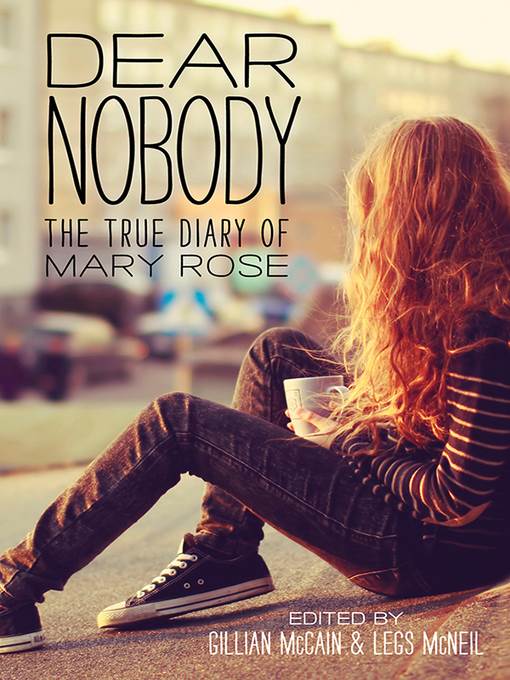
Dear Nobody
The True Diary of Mary Rose
فرمت کتاب
ebook
تاریخ انتشار
2014
Lexile Score
790
Reading Level
3-4
ATOS
5.4
Interest Level
9-12(UG)
نویسنده
Legs McNeilناشر
Sourcebooksشابک
9781402287596
کتاب های مرتبط
- اطلاعات
- نقد و بررسی
- دیدگاه کاربران
نقد و بررسی

February 17, 2014
Between the ages of 15 and 18, until her death in 1999 of cystic fibrosis, a Pennsylvania teenager named Mary Rose wrote unguardedly in her journals. McCain and McNeil (co-editors of Please Kill Me: An Oral History of Punk) offer a condensed but otherwise unaltered version of her diary entries and the occasional letter. Despite any ethical issues raised by publishing the book, which Mary Rose’s mother touches on in an afterword, Mary Rose’s writing has an immediate and viscerally raw impact as she describes her fights with her mother, a magnet for abusive, criminal boyfriends; her own tempestuous experiences with romance, sex, alcohol, and drugs; and the agony of cystic fibrosis. “I definitely won’t binge anymore,” writes Mary Rose after one rehab stint. “HA! That resolution lasted three days!” opens the next entry. Mary Rose’s enormous pain and the ways she attempts to swallow it are evident in every profane, rage-filled entry; while her anguish is near-constant, it’s spiked with moments of biting humor, elation, and hope. It’s a rare, no-holds-barred documentation of an American teenager’s life, written for no audience but herself. Ages 14–up.

March 15, 2014
The posthumous memoir of a drug-abusing teen who died of cystic fibrosis. Living in suburban Pennsylvania in the late 1990s, Mary Rose uses her journal, addressed to "Dear Nobody," to chronicle her daily life: She's bored, frequently on the outs with her mom and searching for something. She hangs out at the nearby rope swing with other teens, drinking and doing drugs, getting arrested and hoping to find a friend--or even better, a boyfriend. But things change when Mary Rose has to deal with something she isn't facing head-on: She suffers from cystic fibrosis, and her condition is deteriorating due to her drinking and drug use. Mary Rose attempts to turn over a new leaf only to fall back into drinking and suffers a new tragedy. Yet through it all, as her body begins to give out, Mary Rose strives for peace through religion and searches for a connection with other people. Edited from Mary Rose's journals after her death, this memoir necessarily suffers from the absence of an authorial hand, shifting abruptly from Mary Rose's party-girl ways to her medical suffering. Mary Rose evidently never had a chance to reflect on the total arc of her written narrative, forcing readers to glean meaning from the disparate, angst-filled entries or just go with the flow. While the voice is authentic, this book is an experience, not a crafted narrative. (Memoir. 14-18)
COPYRIGHT(2014) Kirkus Reviews, ALL RIGHTS RESERVED.

April 1, 2014
Gr 9 Up-In this actual, posthumously published diary, the teenager is brutally honest about her problems with her mom and her mom's abusive boyfriend, her sexual encounters, and her addictions to alcohol and drugs. Lonely and looking for relationships, the girl begins every entry with "Dear Nobody." Readers learn early on about Mary's stints in rehab, but it is a third of the way into the book when it is revealed that she has cystic fibrosis. Mary Rose has been in and out of the hospital all her life with this disease, but she doesn't dwell on it. Like the fictional Go Ask Alice (Prentice Hall, 1971), this is a first-person account of a girl detailing the poor choices she has made. Though a depressing picture emerges, the writing style has a beautiful lyricism. Teens may not understand Mary Rose's decisions, and they may dislike how those who care about her treat her, but readers will appreciate this unflinchingly honest work.-Elizabeth Kahn, Patrick F. Taylor Science & Technology Academy, Jefferson, LA
Copyright 2014 School Library Journal, LLC Used with permission.

























دیدگاه کاربران